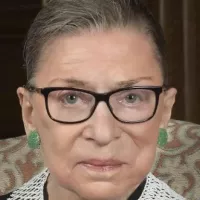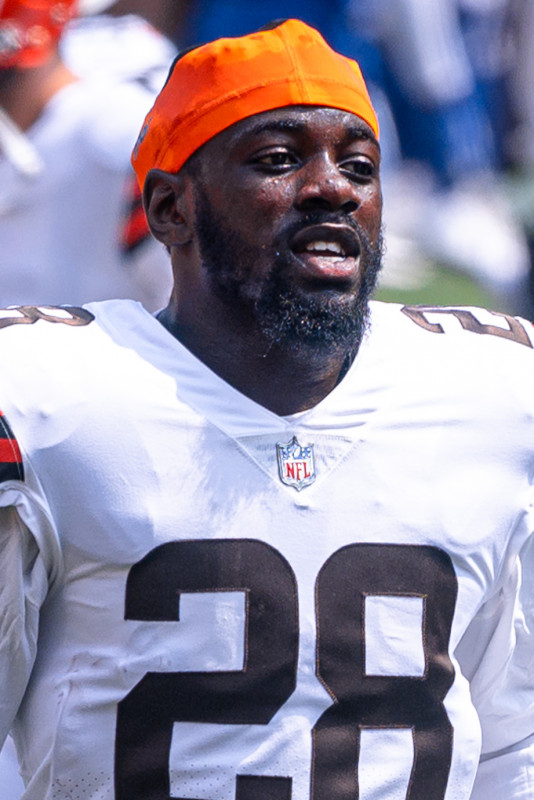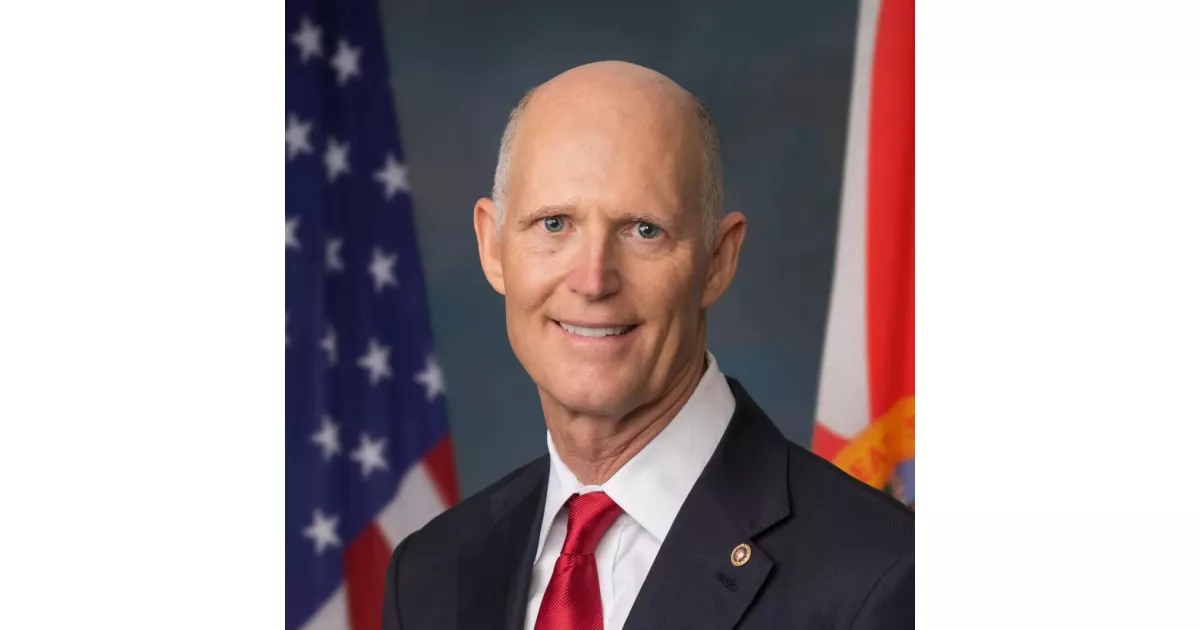Richard Lynn "Rick" Scott is an American politician currently serving as the senior United States Senator from Florida since 2019. He is a member of the Republican Party. Prior to his senatorial role, Scott served as the 45th Governor of Florida for two terms, from 2011 to 2019. Beyond his political career, Scott has experience as an attorney and businessman. He is also a Navy veteran.
1928: Birth of Mother Esther J. Scott
In 1928, Esther J. Scott, Rick Scott's mother, was born.
May 11, 1952: Frances Annette Holland Born
On May 11, 1952, Frances Annette Holland (later Scott's wife) was born.
December 1, 1952: Rick Scott Born
On December 1, 1952, Richard Lynn Scott, later known as Rick Scott, was born in Bloomington, Illinois.
December 1, 1952: Richard Lynn Myers (Rick Scott) born
On December 1, 1952, Richard Lynn Myers, later known as Rick Scott, was born in Bloomington, Illinois.
1954: Mother remarried and Rick adopted
In 1954, Rick Scott's mother, Esther, married Orba George Scott Jr., who adopted Rick, leading him to take his stepfather's surname and become known as Richard Lynn Scott.
April 20, 1972: Scott Married Frances Annette Holland
On April 20, 1972, Rick Scott, then aged 19, married his high school sweetheart, Frances Annette Holland, who was also 19 years old.
1972: Married Ann Holland
In 1972, Rick Scott married Ann Holland in a Baptist church in Kansas City.
1975: Graduated from University of Missouri–Kansas City
In 1975, Rick Scott graduated from the University of Missouri–Kansas City with a bachelor of business administration.
1978: Licensed to Practice Law
In 1978, Rick Scott was licensed to practice law by the Texas Bar after earning a juris doctor degree from Southern Methodist University.
April 1987: Attempt to Buy Hospital Corporation of America (HCA)
In April 1987, Rick Scott attempted to buy the Hospital Corporation of America (HCA) for $3.85 billion but the offer was declined.
1987: Co-founded Columbia Hospital Corporation
In 1987, Rick Scott co-founded Columbia Hospital Corporation after serving in the U.S. Navy and becoming a law firm partner.
1988: Founded Columbia Hospital Corporation
In 1988, Rick Scott and Richard Rainwater each invested $125,000 to create Columbia Hospital Corporation.
1989: Columbia Hospital Corporation Owned Four Hospitals
By the end of 1989, Columbia Hospital Corporation owned four hospitals with a total of 833 beds.
1992: Columbia Stock Purchase of Basic American Medical
In 1992, Columbia Hospital Corporation made a stock purchase of Basic American Medical, which owned eight hospitals.
September 1993: Columbia Acquired Galen Healthcare
In September 1993, Columbia Hospital Corporation acquired Galen Healthcare, which had about 90 hospitals, in a $3.4 billion stock purchase.
1994: Columbia Merged with HCA
In 1994, Columbia Hospital Corporation merged with HCA, forming the largest for-profit health care company, and Rick Scott became CEO of Columbia/HCA.
1995: Rick Scott met Karen Bowling
In 1995, Rick Scott met Karen Bowling after Columbia bought Memorial Hospital.
March 19, 1997: FBI Raids Columbia/HCA Facilities
On March 19, 1997, the Federal Bureau of Investigation, Internal Revenue Service, and Department of Health and Human Services executed search warrants at Columbia/HCA facilities and doctors suspected of ties to the company.
July 1997: Columbia/HCA Purchased Controlling Interest in America's Health Network
In July 1997, Columbia/HCA Healthcare purchased a controlling interest in America's Health Network (AHN), but pulled out of the deal because Scott and Vandewater were terminated.
1997: Resigned as CEO of Columbia/HCA
In 1997, Rick Scott was pressured to resign as chief executive of Columbia/HCA due to the company defrauding Medicare, Medicaid, and other federal programs.
1997: Launched Richard L. Scott Investments
In 1997, after leaving Columbia/HCA, Rick Scott launched Richard L. Scott Investments.
1998: Purchased Stake in CyberGuard Corporation
Between 1998 and 2001, Rick Scott purchased 50% of CyberGuard Corporation for approximately $10 million.
1998: Scott Led Investment in AHN
In 1998, Rick Scott and Vandewater led a group of investors who gave America's Health Network (AHN) a major infusion of cash.
1999: AHN Available in 9.5 Million Homes
By early 1999, America's Health Network (AHN) was available in 9.5 million American homes.
1999: AHN Merged with Fit TV
In mid-1999, America's Health Network (AHN) merged with Fit TV, becoming The Health Network.
September 2000: WebMD Planned to Relaunch The Health Network
In September 2000, WebMD planned to relaunch The Health Network as WebMD Television, but announced cutbacks and restructuring.
2000: Scott Pleaded the Fifth Amendment
During Rick Scott's 2000 deposition, he pleaded the Fifth Amendment 75 times.
January 2001: News Corp. Regained Ownership of The Health Network
In January 2001, News Corp. regained 100% ownership of The Health Network.
September 2001: Fox Sold The Health Network to Discovery Health Channel
In September 2001, Fox Cable Networks Group sold The Health Network to the Discovery Health Channel for $155 million in cash and a 10% equity stake.
2001: Purchased Stake in CyberGuard Corporation
Between 1998 and 2001, Rick Scott purchased 50% of CyberGuard Corporation for approximately $10 million.
2001: Co-founded Solantic
In 2001, Rick Scott co-founded Solantic, based in Jacksonville, Florida, with Karen Bowling.
2002: Columbia/HCA pleaded guilty to 14 felonies
In 2002, Columbia/HCA pleaded guilty to 14 felonies and agreed to a $600+ million fine for healthcare fraud.
2002: Solantic Opened First Urgent Care Center
In 2002, Solantic opened its first urgent care center providing services such as immunizations, physicals, and drug screening.
2002: HCA Agreed to Pay the US Government $631 Million
In late 2002, HCA agreed to pay the United States government $631 million, plus interest, and $17.5 million to state Medicaid agencies.
February 2005: Purchased Continental Structural Plastics, Inc.
In February 2005, Rick Scott purchased Continental Structural Plastics, Inc. (CSP) in Detroit, Michigan.
2005: Provided Initial Funding to Alijor.com
In 2005-2006, Rick Scott provided initial funding of $3 million to Alijor.com.
July 2006: CSP Purchased Budd Plastics
In July 2006, Continental Structural Plastics (CSP), which Rick Scott purchased earlier, acquired Budd Plastics from ThyssenKrupp.
2006: Death of Stepfather Orba George Scott Jr.
In 2006, Orba George Scott Jr., Rick Scott's stepfather, passed away.
2006: Scott Announced Plans for Solantic
In 2006, Rick Scott announced his plans to establish a national brand of medical clinics for Solantic.
2006: Co-founded Alijor.com
In 2006, Rick Scott co-founded Alijor.com with his daughter Allison, to allow healthcare providers to post pricing and insurance information.
May 23, 2007: Solantic Settles Employment Discrimination Suit
On May 23, 2007, Solantic settled an employment discrimination suit for an undisclosed sum. The suit alleged a policy against hiring elderly or obese applicants. Rick Scott responded to claims of discrimination by noting demographic statistics of Solantic's employees.
August 2007: Solantic Receives $40 Million Investment
In August 2007, Solantic received a $40 million investment from a private equity firm. The company announced plans to open 35 clinics by the end of 2009, projecting annual revenues of $100 million, a significant increase from the current $20 million.
May 2008: Purchased Drives
In May 2008, Rick Scott purchased Drives, a designer and manufacturer of heavy-duty drive chain-based products and assemblies.
February 2009: Scott Forms Conservatives for Patients' Rights
In February 2009, Rick Scott founded Conservatives for Patients' Rights (CPR), intending to influence Democrats to adopt free-market principles in health care legislation.
March 2009: Scott Gives $5 Million to CPR Ad Campaign
As of March 2009, Rick Scott had contributed approximately $5 million towards a planned $20 million advertising campaign by Conservatives for Patients' Rights (CPR).
April 9, 2010: Scott Announces Candidacy for Governor of Florida
On April 9, 2010, Rick Scott officially announced his candidacy for the Republican nomination for governor of Florida.
2010: Florida voters passed constitutional amendments banning gerrymandering.
In 2010, Florida voters passed constitutional amendments banning gerrymandering of congressional and legislative districts.
2010: Ran for governor as immigration hard-liner
In 2010, Rick Scott ran for governor as an immigration hard-liner, favoring similar laws as Arizona's SB 1070 and calling for police to check individuals' immigration status.
2010: Elected Governor of Florida
In 2010, Rick Scott was elected as the governor of Florida after defeating Bill McCollum in the Republican primary and Alex Sink in the general election.
2010: Scott's Net Worth Estimated
In 2010, Rick Scott's net worth was estimated at US$219 million.
2010: NRA-PVF Endorsed Scott
In 2010, the NRA-PVF endorsed Rick Scott for governor, citing his support for gun rights.
January 4, 2011: Scott Takes Office as Governor of Florida
On January 4, 2011, Rick Scott assumed office as the 45th governor of Florida after defeating his opponent by approximately 68,000 votes.
February 2011: Withdrew request to approve redistricting amendments
In February 2011, Rick Scott withdrew a request to the United States Department of Justice to approve constitutional amendments banning gerrymandering, potentially delaying the redistricting plan.
February 16, 2011: Rejected Federal Funding for High-Speed Rail
On February 16, 2011, Rick Scott rejected $2.3 billion in federal funding for high-speed rail between Tampa and Orlando, citing concerns about cost overruns.
March 1, 2011: Senators Petitioned Supreme Court Over Rail Funds
On March 1, 2011, two Florida state senators filed a petition with the Florida Supreme Court to compel Rick Scott to accept the rail funds.
March 2011: Initiated PortMiami Dredging Project
In March 2011, Rick Scott moved to have the Florida Department of Transportation amend its work plan to include $77 million for dredging PortMiami to a depth of 50 feet to accommodate Panamax-sized vessels.
October 2011: Scott Announces Reelection Run in 2014
In October 2011, Rick Scott declared his intention to seek reelection in 2014. His political funding committee had raised $28 million for his campaign as of May 2014.
2011: Scott appointed Pasco County Sheriff
In 2011, Rick Scott appointed Chris Nocco as Pasco County Sheriff.
2011: Became Governor of Florida
In 2011, Rick Scott began his service as the 45th Governor of Florida, serving two terms until 2019.
2011: Opposed In-State Tuition for Illegal Immigrants
In 2011, Rick Scott opposed giving in-state tuition for illegal immigrants.
2011: Signed Firearm Owners' Privacy Act
In 2011, Rick Scott signed the Firearm Owners' Privacy Act (informally called "Docs vs. Glocks"), restricting doctors from inquiring about patients' gun ownership.
2011: Restrictive Clemency Rules
In 2011, the Brennan Center for Justice described the clemency rules issued by Scott as among the most restrictive in the country.
2012: Voter roll purge attempt
In 2012, Rick Scott attempted to purge non-citizens from voter rolls just before the election; a court stopped him from doing so, and it was revealed that legitimate voters were on the voter rolls. Also during Scott's tenure, Florida had the longest voting lines of any state in the 2012 election.
2012: Death of Mother Esther J. Scott
In 2012, Rick Scott's mother, Esther J. Scott, née Fry, passed away.
2012: Scott's Net Worth Estimated
In 2012, Rick Scott's net worth was estimated at $84 million.
2012: Court Ruling on Voter Registration Fines
In 2012, a court ruled that Rick Scott could not place heavy fines on groups that registered voters but failed to submit the registrations within 48 hours.
2013: Ordered Pinellas County to close mail ballot submission sites
In 2013, Rick Scott ordered Pinellas County to close down sites where voters could submit mail ballots.
2013: Vetoed legislation on temporary driving licenses for DACA-eligible immigrants
In 2013, Rick Scott vetoed legislation that would have given DACA-eligible immigrants the ability to obtain temporary driving licenses.
2013: Scott's Net Worth Estimated
In 2013, Rick Scott's net worth was estimated at $133 million.
June 2014: Scott Spends Heavily on Ads Attacking Crist
As of early June 2014, Rick Scott had spent nearly $13 million since March on television ads targeting former governor Charlie Crist, then the likely Democratic nominee. These ads led to a decline in Crist's favorability.
September 2014: Scott's TV Ad Spending Exceeds $35 Million
By late September 2014, Rick Scott's television advertising expenditure had surpassed $35 million in his campaign efforts.
September 2014: Crist Seeks Support from Black Voters
In September 2014, Charlie Crist aimed to gain significant support from Florida's Black voters. A poll indicated his support among Black voters was 72%, which was below the 90% believed to be needed to defeat Rick Scott.
November 4, 2014: Scott Wins Reelection Against Crist
On November 4, 2014, Rick Scott and Carlos Lopez-Cantera were victorious in the general election against Charlie Crist and Annette Taddeo-Goldstein by 64,000 votes. The Libertarian candidates received 223,356 votes.
December 2014: Drug Screening Law Declared Unconstitutional
In December 2014, the United States Court of Appeals for the Eleventh Circuit upheld the ruling that Florida's law mandating drug screenings for welfare applicants was unconstitutional. The Scott administration chose not to appeal the decision to the US Supreme Court.
2014: Moderated stance on illegal immigration
By 2014, PolitiFact wrote that Rick Scott had "abandoned promises to get tough on illegal immigration," as he moderated his views over time.
2014: Blocked Gainesville's request for early voting site
In 2014, Rick Scott blocked a request by the city of Gainesville to use a facility at the University of Florida as a site for early voting.
2014: Signed DREAMers in-state tuition bill
In 2014, Rick Scott reversed course and signed a bill giving DREAMers in-state tuition in an effort to place limits on how much state institutions can raise tuition each year.
2014: Re-elected as Governor of Florida
In 2014, Rick Scott was re-elected as Governor of Florida, defeating former governor Charlie Crist.
2014: NRA-PVF Endorsed Scott
In 2014, the NRA-PVF endorsed Rick Scott for governor, stating that he had "signed more pro-gun bills into law–in one term–than any other governor in Florida history".
March 2015: Accusations of banning "climate change" terminology
In March 2015, Rick Scott's administration faced accusations of instructing the Department of Environmental Protection officials to avoid using the terms "climate change" or "global warming" in official communications; however, Scott denied the allegations.
July 1, 2015: Scott's Net Worth Growth
On July 1, 2015, it was reported that Rick Scott's net worth had grown to $147 million.
August 2015: Scott's Approval Rating at 45 Percent
As of August 2015, Rick Scott's approval rating was at 45 percent, showing a steady increase from a low of 26 percent in December 2011.
2015: Conduent Contract and SunPass Controversy
In 2015, Rick Scott was an investor in Conduent Inc., which was awarded a $287 million Florida contract to manage SunPass. Due to glitches in SunPass, motorists were charged fees, and Scott defended the department's handling of the controversy.
January 2016: US Supreme Court Strikes Down Part of Timely Justice Act
In January 2016, the Supreme Court of the United States invalidated a section of Florida's Timely Justice Act in Hurst v. Florida, deeming a judge's determination of aggravating factors for a death sentence based on a non-binding jury recommendation unconstitutional.
October 2016: Florida Supreme Court Strikes Down New Sentencing Scheme
In October 2016, the Florida Supreme Court struck down a new statute intended to comply with Hurst v. Florida, ruling that a death sentence must be issued by a unanimous jury. This ruling created uncertainty regarding existing sentences and the process for seeking the death penalty.
2016: Refusal to extend registration deadlines after Hurricane Matthew
In 2016, Rick Scott refused to extend registration deadlines after ordering evacuations due to Hurricane Matthew; courts ultimately extended the deadline. He also signed legislation that rejected mail ballots where signatures on the ballot envelope did not match signatures in files; in 2016 a court struck down the law.
2016: Scott Endorses Trump and Chairs Pro-Trump PAC
In 2016, after Donald Trump won the Florida primary, Rick Scott endorsed Trump. He also chaired a pro-Trump super PAC during the 2016 election.
December 31, 2016: Scott's Net Worth Growth
On December 31, 2016, it was reported that Rick Scott's net worth had grown to $149 million.
March 2017: Former felons file class action lawsuit
In March 2017, seven former felons filed a class action lawsuit, arguing that the clemency board's decisions were inconsistent, vague, and political.
April 2017: Scott's Approval Rating Reaches 57 Percent
In April 2017, Rick Scott's approval rating reached 57 percent, reflecting a positive trend during his governorship.
June 9, 2017: Signed Expanded Stand-Your-Ground Law
On June 9, 2017, Rick Scott signed an expanded version of Florida's stand-your-ground law into law.
2017: Scott said people with preexisting conditions should be protected.
In 2017, Rick Scott said that people with preexisting conditions should be protected.
2017: Accusations of fueling HIV epidemic
In 2017, Rick Scott was accused of fueling an HIV epidemic while governor, by ensuring that Florida returned $54 million in unspent federal HIV-prevention grants and blocking $16 million in CDC grants to Miami-Dade and Broward counties. The state accounted for 13% of the country's HIV diagnoses.
2017: Lawsuit over disclosure of wealth
In 2017, a lawsuit was filed by a Democratic activist claiming Rick Scott had not disclosed sufficient information about his wealth and holdings. The appeals court agreed that only the Commission on Ethics had constitutional authority to investigate the complaint.
2017: Provisions of Firearm Owners' Privacy Act Struck Down
In 2017, provisions of the Firearm Owners' Privacy Act, including the part forbidding doctors from asking about a patient's gun ownership, were struck down as unconstitutional by the United States Court of Appeals for the Eleventh Circuit.
December 31, 2017: Scott's Net Worth Growth
On December 31, 2017, it was reported that Rick Scott's net worth had grown to $232 million.
February 2018: A+ Rating from NRA Political Victory Fund
As of February 2018, Rick Scott held an A+ rating from the NRA Political Victory Fund (NRA-PVF), indicating a record of supporting gun rights.
February 2018: Court Rules Scott's Felon Voting Rights Process Unconstitutional
In February 2018, a U.S. District Court ruled that Rick Scott's process for restoring felons' voting rights was arbitrary and unconstitutional. The court mandated that Scott create a new process, stating that Scott and his clemency board had "unfettered discretion" to deny voting rights "for any reason."
February 2018: Support for gun control measures after Stoneman Douglas shooting
In February 2018, after the Stoneman Douglas High School shooting in Parkland, Florida, Rick Scott voiced support for raising the minimum age to purchase a firearm to 21 and banning bump stocks, requesting $500 million for mental health and school safety programs.
March 2018: Marjory Stoneman Douglas High School Public Safety Act passed and signed
In March 2018, the Florida Legislature passed the Marjory Stoneman Douglas High School Public Safety Act, which incorporated many of the measures Rick Scott supported, including raising the minimum age for buying firearms to 21 and banning bump stocks. Scott signed the bill into law on March 9, 2018. That same day, the National Rifle Association filed a lawsuit in federal court challenging the law's provision banning gun sales to people under 21.
April 9, 2018: Scott Announces U.S. Senate Run
On April 9, 2018, Rick Scott officially announced that he would challenge incumbent Democratic U.S. Senator Bill Nelson in the 2018 election, following months of speculation.
June 2018: Opposed Trump Administration Family Separation Policy
In June 2018, Rick Scott opposed the Trump administration's family separation policy, sending a letter to the United States secretary of health and human services, stating that he did not agree with the practice.
June 2018: Declined to criticize Trump administration on Obamacare
In June 2018, when the Trump administration sought to remove provisions of Obamacare protecting people with preexisting conditions, Rick Scott declined to criticize the administration, saying he did not know enough about it to comment.
July 2018: Judge ruled against prohibition of early voting on campus
In July 2018, a judge ruled against Rick Scott's prohibition of early voting on campus, saying the ban showed a "stark pattern of discrimination."
July 2018: Scott's Earnings in Cayman Islands Hedge Funds
In a July 2018 financial disclosure statement, Rick Scott and his wife reported earnings of at least $2.9 million in hedge funds registered in the Cayman Islands, a tax haven.
August 2018: Scott's Net Worth Estimated
In August 2018, Rick Scott's net worth was estimated at $255 million.
October 2018: Report on Scott's Blind Trust
In October 2018, The New York Times reported that Rick Scott's blind trust was not truly blind, as he had ways of knowing his precise holdings, including investments in companies and funds that his administration's policies could impact.
November 18, 2018: Scott Prevails in Senate Race After Recount
On November 18, 2018, Florida elections officials announced that Rick Scott had prevailed in the Senate race against Bill Nelson after a recount. Scott received 50.05% of the vote to Nelson's 49.93%, with a margin of victory of 10,033 votes out of 8.19 million votes cast.
December 4, 2018: Scott Announces He Will Finish His Term as Governor
On December 4, 2018, Rick Scott's office announced that he would finish his term as governor and not resign early.
2018: Spoke in Favor of Path to Citizenship for DREAMers
By 2018, Rick Scott spoke in favor of giving DREAMers a path to citizenship.
2018: Water Contamination Crisis
In 2018, Florida faced a water contamination crisis which stirred controversy due to the $700 million cuts made by Rick Scott from Florida's water management districts during his time as governor.
2018: Supported high-speed rail project
In 2018, Rick Scott reversed course and supported a high-speed rail project between Tampa and Orlando when the company All Aboard Florida sought taxpayer-backed funding. He and his wife had invested at least $3 million in the parent company of All Aboard Florida, which had made donations to Scott's political campaigns.
2018: Scott Supports All Aboard Florida
In 2018, Rick Scott supported All Aboard Florida's efforts to build high-speed rail and obtain taxpayer financing, despite previously rejecting federal funding for high-speed rail early in his governorship.
2018: Won U.S. Senate Election
In 2018, Rick Scott won the U.S. Senate election against incumbent Democrat Bill Nelson after a mandatory recount.
2018: Ran for U.S. Senate
In 2018, Rick Scott, barred by term limits from running for reelection as governor, ran for the U.S. Senate.
2018: Voting Rights Investigation and Approval Discrepancies
In 2018, an investigation by the Palm Beach Post found that during Rick Scott's governorship, he restored voting rights to three times as many white men as black men, despite blacks comprising a significant portion of those released from state prisons. Only 27% of those granted restored voting rights were black, while 43% of those released from state prisons in the past 20 years were black. This was the lowest percentage of blacks among those whose voting rights were restored in over 50 years.
January 3, 2019: Start of Senate Term
On January 3, 2019, the Senate term for the 116th Congress began.
January 8, 2019: Took Office as U.S. Senator
On January 8, 2019, Rick Scott took office as a U.S. Senator from Florida, following the expiration of his term as governor.
January 2019: Encouragement to Declare National Emergency for Border Wall
In January 2019, Rick Scott encouraged then-President Donald Trump to declare a national emergency to build a border wall if Congress would not provide the necessary funds.
February 2019: Scott Ends Trust Holdings
In February 2019, Rick Scott announced that he would no longer keep his holdings in a trust.
February 2019: Applauding the National Emergency Declaration
In February 2019, Rick Scott applauded Donald Trump's decision to declare a national emergency to build a border wall.
April 2019: Scott Urges Military Action in Venezuela
In April 2019, amid calls for American military intervention in Venezuela, Rick Scott asserted that the Maduro regime was perpetrating a "genocide" and that the U.S. was "not aggressive enough" regarding the situation. He called on the U.S. to position its military assets in preparation for responding to events in Venezuela.
2019: Became U.S. Senator from Florida
In 2019, Rick Scott became the senior United States Senator from Florida, a position he has held since then.
May 2020: Vote on FISA Amendment
In May 2020, Rick Scott voted for an amendment that would have required federal intelligence and law enforcement agencies to obtain federal court warrants when collecting web search engine data from American citizens under the Foreign Intelligence Surveillance Act (FISA).
September 3, 2020: Tampa Bay Times report on "predictive policing" program
On September 3, 2020, the Tampa Bay Times released an investigative report into Rick Scott-appointed Pasco County Sheriff Chris Nocco's "predictive policing" program, which relies on unproven algorithms.
September 18, 2020: Scott Calls for Swift Replacement of Ginsburg
After Supreme Court Justice Ruth Bader Ginsburg's death on September 18, 2020, Rick Scott sided with Senator Mitch McConnell and called for her replacement to be voted on before that year's presidential election.
November 10, 2020: Scott Selected for NRSC Chairmanship
On November 10, 2020, Rick Scott was formally selected as the chairman of the National Republican Senatorial Committee (NRSC), succeeding Senator Todd Young.
2020: Scott Wealthiest Member of Congress
Based on financial disclosure reports covering 2020, it was reported that Scott has a minimum net worth of just over $200 million, making him the wealthiest member of Congress.
2020: Objections to Electoral Seating
In 2020, after Donald Trump lost the presidential election and made false claims of fraud, Rick Scott voted to object to seating the electors from Pennsylvania but voted against the objection for Arizona. Both objections were rejected by the Senate.
March 2021: Opposition to American Rescue Plan Act
In March 2021, Rick Scott voted against the American Rescue Plan Act and called upon Florida and other states to reject federal assistance from the package after it passed.
May 2021: Vote Against January 6 Commission
In May 2021, Rick Scott voted against creating an independent commission to investigate the January 6 United States Capitol attack.
February 22, 2022: Release of 11-Point Plan to Rescue America
On February 22, 2022, Rick Scott released his controversial 11-Point Plan to Rescue America. The plan included proposals such as forcing all Americans to pay some income tax, sunsetting all federal legislation within five years (potentially affecting Social Security and Medicare), closing the United States Department of Education, and completing the Mexico–United States border wall.
March 10, 2022: Vote Against Spending Bill with Ukraine Aid
On March 10, 2022, Rick Scott was among 31 Republicans who voted against a $1.5 trillion spending bill, that included $13.6 billion in military assistance for Ukraine's defense. He argued the bill was filled with lawmakers' "pet" projects.
June 8, 2022: Release of Revision of 11-Point Plan
On June 8, 2022, Rick Scott released a revision of his 11-Point Plan, replacing the income tax proposal with a proposal not to provide government assistance to "able-bodied Americans under 60 [without] young children or incapacitated dependents" who are not working. He also added a 12th point clarifying that the plan "cuts taxes."
June 2022: Support for Overturning Roe v. Wade
In June 2022, Rick Scott supported the overturning of Roe v. Wade, stating it was based on "flawed legal reasoning" and that the Supreme Court had defended "human dignity" and federalism.
August 2022: STOCK Act Violation Allegation
In August 2022, Business Insider reported that Rick Scott allegedly violated the Stop Trading on Congressional Knowledge (STOCK) Act of 2012. This occurred after Scott and his wife sold stock in Emida Corporation worth up to $450,000 in September 2021, but Scott did not report it until August 2022, exceeding the 45-day reporting requirement.
August 2022: Open Letter Discouraging IRS Job Applications
In August 2022, Rick Scott published an open letter encouraging job seekers not to apply for newly funded positions at the IRS. He vowed that Republicans would "defund" those jobs if they took control of Congress in January 2023.
November 14, 2022: Scott Challenges McConnell for Senate Leadership
On November 14, 2022, Rick Scott announced he would challenge Mitch McConnell for the position of Senate Minority Leader in the 118th United States Congress. He said that the status quo was broken and big change was needed.
2022: Sponsored or Co-Sponsored Senate Bills
In 2022, Notable Senate bills that Scott has sponsored or co-sponsored include the Sunshine Protection Act, which makes daylight saving time in the United States permanent; the PROTECT Kids Act, which cuts federal funding to schools that allow students to change their preferred pronouns and keep their sexual orientation from their parents; the National Defense Authorization Act for Fiscal Year 2022; and the END FENTANYL Act.
2022: Voted against Bipartisan Safer Communities Act
In 2022, Rick Scott voted against the Bipartisan Safer Communities Act, a gun reform bill introduced following the school shooting at Robb Elementary School in Uvalde, Texas.
2022: Scott voted against the Inflation Reduction Act.
In 2022, Rick Scott voted against the Inflation Reduction Act, which allows Medicare to negotiate lower drug prices.
2022: Voted against Respect for Marriage Act
In 2022, Rick Scott voted against the Respect for Marriage Act.
March 2023: Vote Against Repealing Iraq AUMF
In March 2023, Rick Scott voted against repealing the Authorization for Use of Military Force (AUMF) in Iraq.
2023: Vote Against Fiscal Responsibility Act
In 2023, Rick Scott was among the 31 Senate Republicans who voted against final passage of the Fiscal Responsibility Act of 2023.
2023: Scott Swatted as Part of Politician Targeting
In 2023, Rick Scott was swatted as part of a larger swatting incident targeting American politicians.
January 2024: Vote Against Resolution on Aid to Israel
In January 2024, Rick Scott voted against a resolution proposed by Senator Bernie Sanders that would have applied the human rights provisions of the Foreign Assistance Act to U.S. military aid to Israel.
November 2024: Candidacy for Senate Majority Leader
After the November 2024 U.S. elections, in which Republicans carried the Senate, Rick Scott was one of three announced candidates to be the next Senate Majority Leader in a race to replace the retiring Mitch McConnell. On November 13, Scott was eliminated on the first ballot with 13 votes.
2024: Won Reelection to U.S. Senate
In 2024, Rick Scott won reelection to the U.S. Senate, defeating Democratic nominee Debbie Mucarsel-Powell.
Mentioned in this timeline

Donald John Trump is an American politician media personality and...
Ukraine is a country in Eastern Europe the second-largest on...

Ruth Bader Ginsburg was an American lawyer and Supreme Court...
The Affordable Care Act ACA also known as Obamacare is...

Addison Mitchell McConnell III is an American politician and attorney...
California is a U S state on the Pacific Coast...
Trending
44 minutes ago Alabama Basketball Faces LSU: A Crucial Road Matchup and Maturity Test Looms

44 minutes ago Jeremiah Owusu-Koramoah's NFL future uncertain due to possible career-ending injury at 26.

2 hours ago Kelvin Sampson's Coaching Philosophy and Houston Cougars' SLAM Magazine Cover

2 hours ago Trace Adkins Hints at Retirement with 2026 Tour Potentially Being His Last

2 hours ago Urgent search: 3-year-old girl missing in Avondale, Amber Alert issued for safe return.

2 hours ago Javonte Williams Signs 3-Year, $24 Million Contract Extension with the Dallas Cowboys
Popular

Jesse Jackson is an American civil rights activist politician and...

Barack Obama the th U S President - was the...

Ken Paxton is an American politician and lawyer serving as...

Bernie Sanders is a prominent American politician currently serving as...
Randall Adam Fine is an American politician a Republican who...

Michael Joseph Jackson the King of Pop was a highly...
